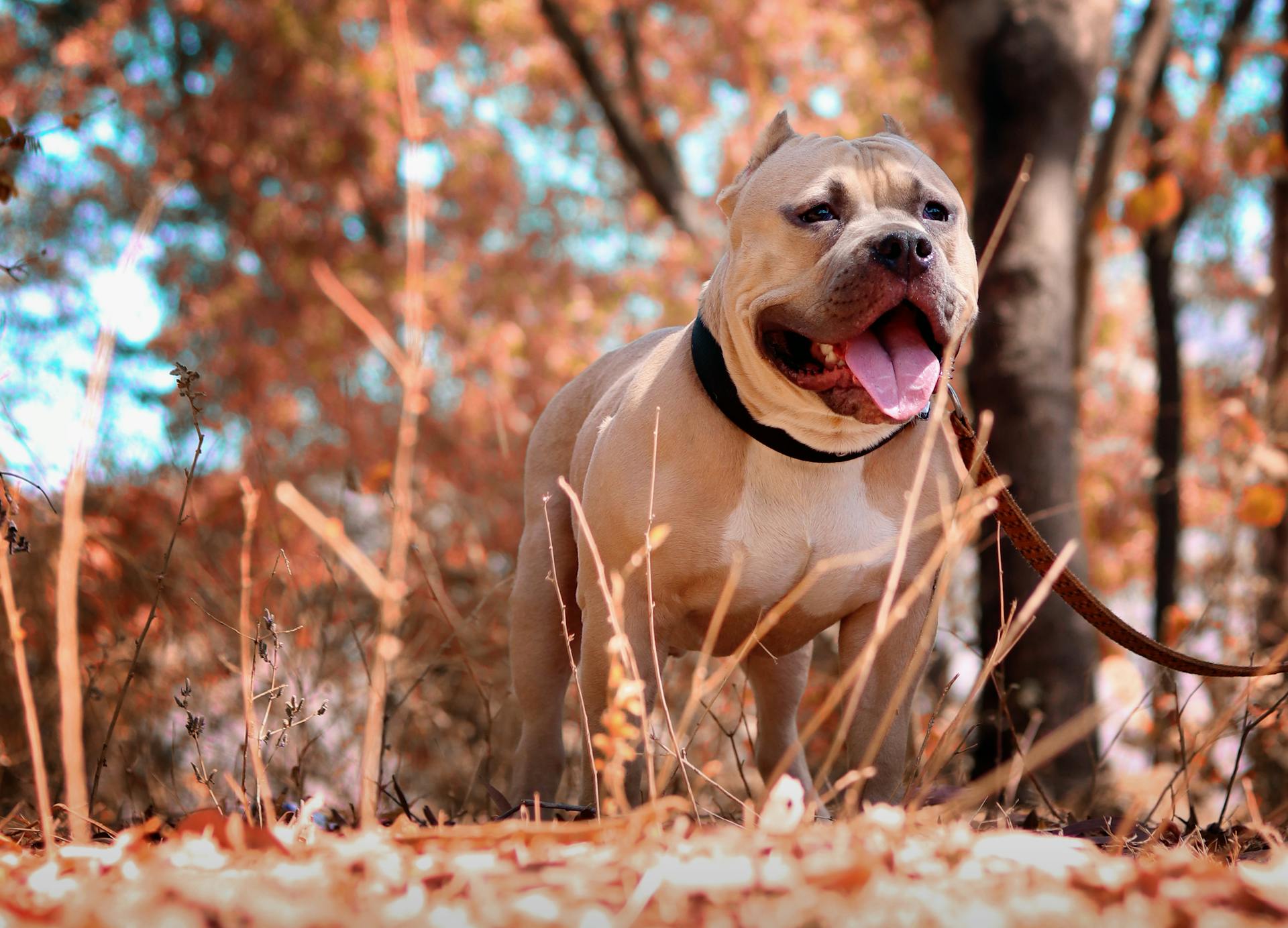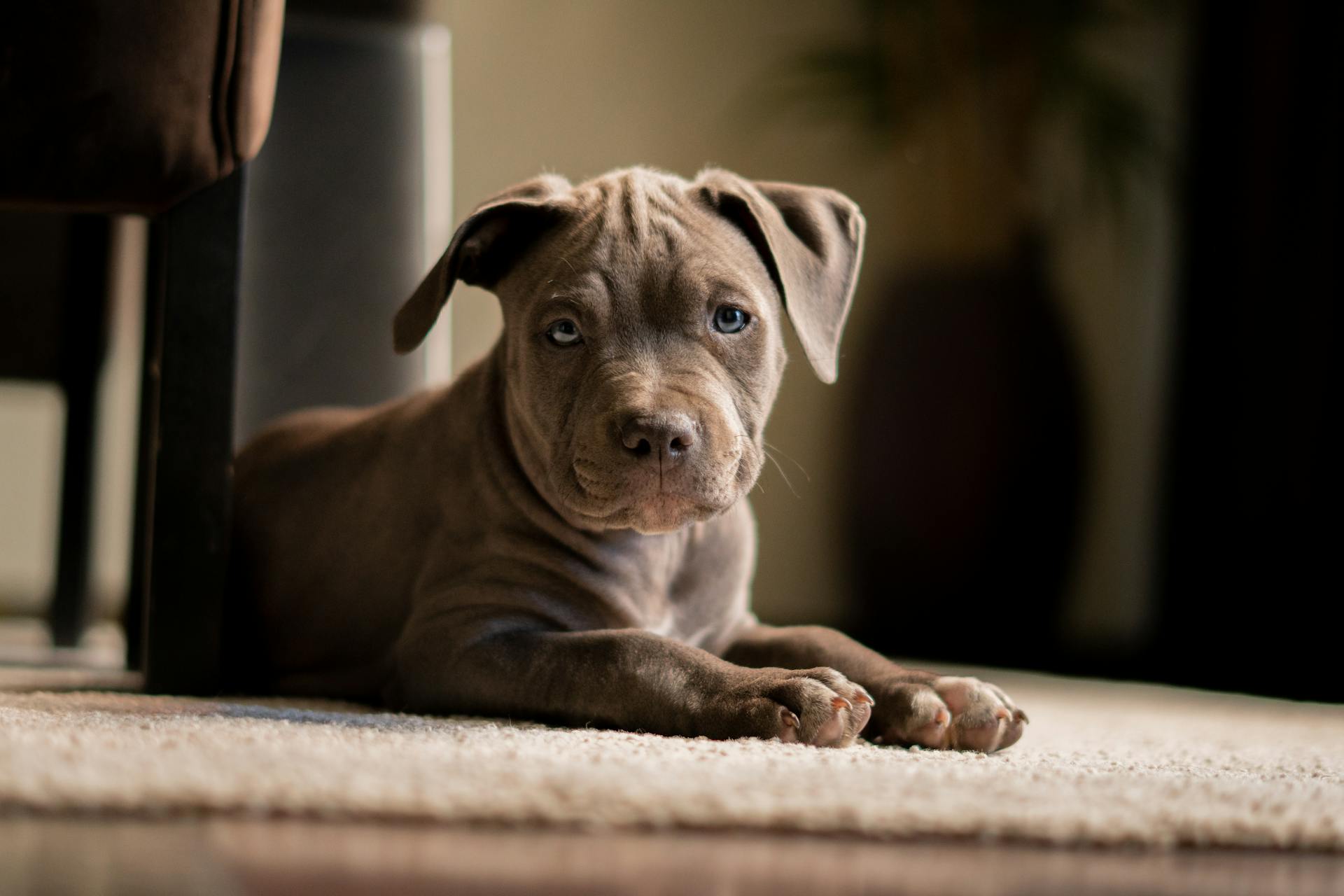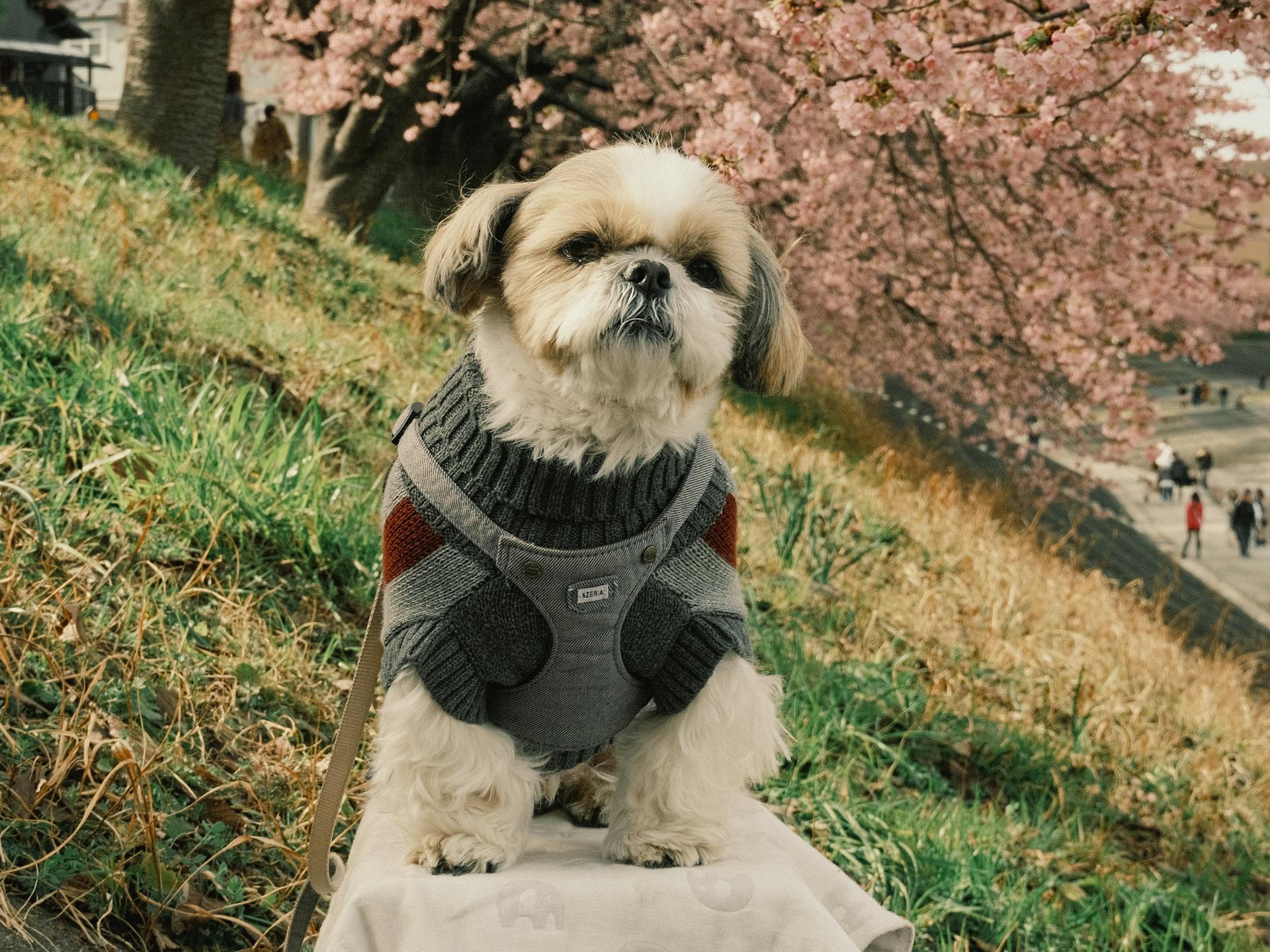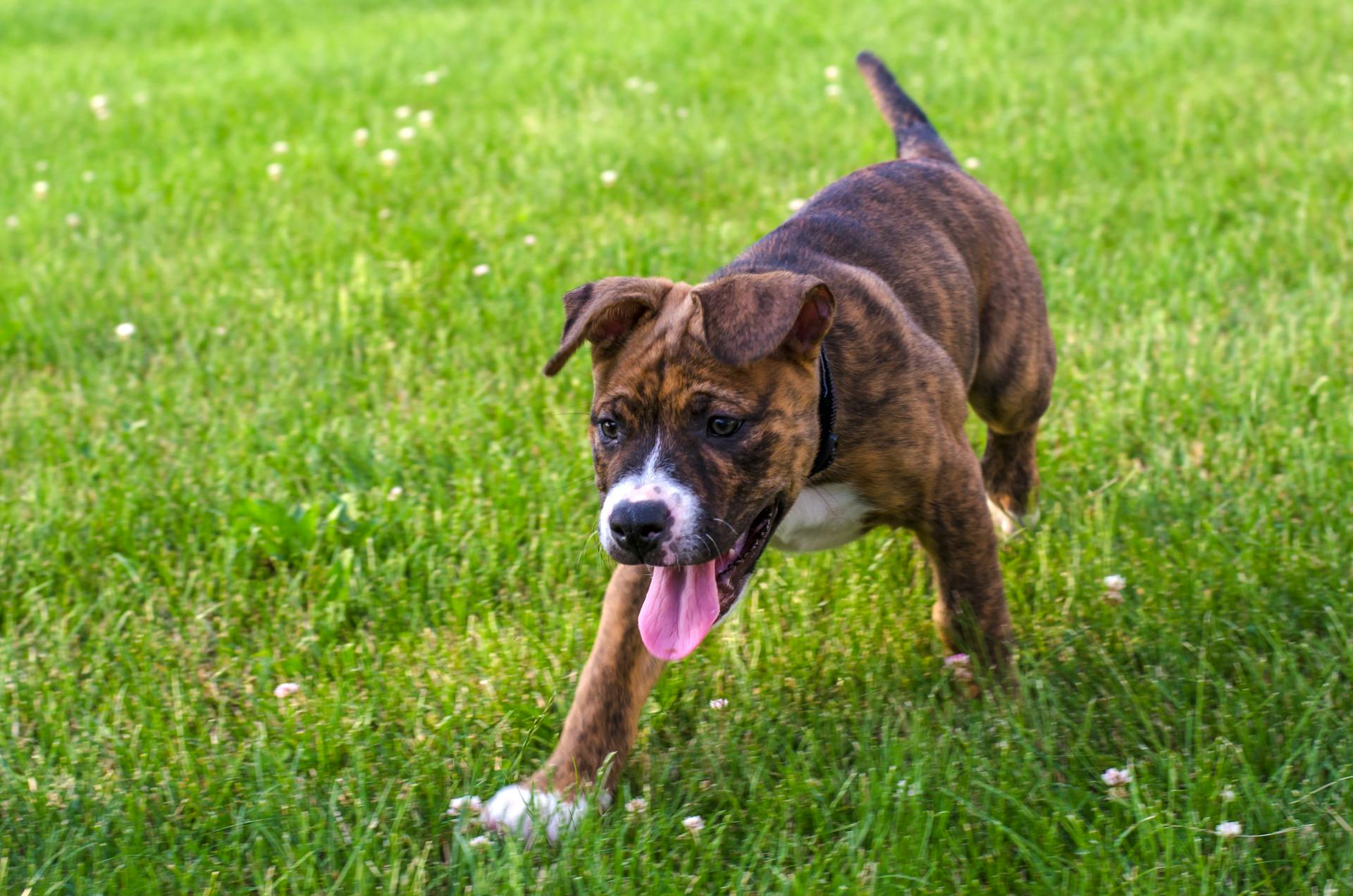
The blue nose full grown Pitbull is a stunning breed, known for its unique coat color and athletic build. They typically weigh between 35-60 pounds and stand between 17-20 inches tall.
One of the most distinctive features of the blue nose Pitbull is its nose color, which can range from a light blue to a dark blue-gray. This coloration is a result of a genetic variation that affects the production of the pigment eumelanin.
In terms of exercise needs, blue nose Pitbulls are highly active dogs that require regular physical activity to stay happy and healthy. They need at least 30 minutes of exercise per day, which can include walks, runs, and playtime in the yard.
With proper care and attention, a blue nose Pitbull can live up to 12-16 years, making them a long-term companion for many families.
Puppies
Blue nose Pitbull puppies may be hard to find due to their rarity, and they may cost more compared to other Pitbull puppies.
You can expect to pay anywhere from $750 to $2,000 for a blue nose Pitbull puppy.
They are often surrendered to shelters due to inexperienced owners or their bad reputation.
Pitbull puppies are energetic and playful, requiring early socialization to people, places, sights, and sounds of other animals.
Early socialization is key with any puppy, regardless of breed, as this will shape their temperament as they mature.
Their energetic nature means you'll want to expose them to new experiences as early as 7 to 16 weeks of age.
With proper socialization, they'll grow into confident and well-adjusted adult dogs.
Curious to learn more? Check out: Tan American Pit Bull Terrier Puppy
Temperament & Intelligence
Blue Nose Pitbulls are intelligent, loving, and eager to please, making them a joy to be around. They form strong bonds with their family members and love participating in activities together.
One thing to know about Blue Nose Pitbulls is that they don't do well being left alone for long periods and are prone to separation anxiety. Exercise them beforehand to prevent destructive behavior.
They're also very active and playful, making them great partners for energetic households. With proper socialization, they're mild and tolerant with kids.
Blue Nose Pitbulls are known to experience a broad spectrum of emotions, which makes them great at forming strong bonds with their owners. They'll let you know how they're feeling through their facial expressions.
Their strong prey drive and territorial instincts mean early socialization is crucial to ensure they get along with other pets.
Suggestion: Pitbull Strong Dog
The Temperament
Pitbulls are intelligent, loving, and eager to please, making them a joy to be around. They form strong bonds with their family members and love participating in activities with them.
Consistent training is essential for Pitbulls, as they can have a stubborn streak. This means setting clear boundaries and expectations from an early age.
Pitbulls don't do well when left alone for long periods and can suffer from separation anxiety. Exercise them before leaving the house to keep them tired and reduce destructive behavior.

Despite their loving nature, Pitbulls can be prone to anxiety, especially when family members leave. This is why it's crucial to consider how long you'll need to leave your dog alone before adopting a Pitbull.
Blue Nose Pitbulls are known for their ability to form robust bonds with their households, making them reliable companions. They're also very active and playful, making them perfect for energetic families.
Early socialization is vital for Blue Nose Pitbulls, especially when it comes to their prey drive and territorial instincts. This ensures they get along well with other pets.
Pitbulls have a reputation for being aggressive, but the facts say otherwise. Almost 90% of Pitbulls tested by the American Temperament Test Society passed the personality test, making them one of the best-scoring dog breeds.
Pitbulls are loving, affectionate, and eager to please, making them great therapy dogs. They love to have fun with their family and are always up for an adventure.
If this caught your attention, see: Is Pitbull Good Family Dog
Not All Pits Will Have
Not all Blue Nose Pits will have a blue nose.
Some Blue Nose Pits may lose their blue nose as they grow, but once they reach 1 to 2 years old, their nose color will be set for life.
The blue nose is a recessive gene, which means it's not guaranteed to be passed down from parents to offspring.
If a Pitbull's grandparents had a blue nose, their puppies may be more likely to have one too.
Owning a Dog
Owning a dog can be a rewarding experience, but it's essential to be aware of the responsibilities that come with it. Blue nose full grown Pitbulls, in particular, require attention to their grooming, exercise, and diet.
They need regular exercise to stay happy and healthy, and a balanced diet is crucial to ensure they live up to 12 to 15 years. With basic grooming and proper care, your Blue nose Pitbull can thrive.
Their energetic nature means they require a lot of attention and interaction, but they are also loyal and loving companions.
Owning Essentials
Owning a dog can be a wonderful experience, but it's essential to consider the long-term commitment. Your furry friend can live up to 12 to 15 years.
Basic grooming is a must for any dog, and Blue Nose Pitbulls are no exception. Regular exercise, a balanced diet, and precautions for health issues can also make a big difference.
Statistically, small or medium-sized dogs are more aggressive than larger ones. But with proper training and care, you can see a positive outcome in their behavior.
Family Dog
Owning a dog can be a wonderful experience, but it's essential to consider whether you're ready for the responsibility. Blue Nose Pitbulls, in particular, make splendid family pets due to their affectionate nature.
They love being around their family and are generally excellent with children. However, because of their size and energy, it's crucial to oversee interactions between small children and your Blue Nose Pitbull to prevent unintended accidents.
You might like: Pitbull Dog Family Tree
Blue Nose Pitbulls form strong bonds with their proprietors and are protective of their family. They're also relatively low maintenance, requiring basic grooming, regular exercise, and a balanced diet.
Their lifespan can range from 12 to 15 years, but it's essential to take precautions for health issues and provide proper care. With the right training and attention, Blue Nose Pitbulls can live happy and healthy lives.
Training a Blue Nose Pitbull is both important and profitable, as they're sensible and eager to please. Early training is vital to prevent behavioral problems down the line, and positive reinforcement strategies like reward, treats, and play work great with this breed.
Additional reading: Training Pit Bulls
Final Thoughts
Welcoming a new furry friend into your life can be a thrilling experience, but it's essential to consider the unique needs and characteristics of the breed you're interested in.
If you're thinking of owning a blue-nosed American Pitbull Terrier, you'll need to factor in the potential health concerns that come with this breed.
While they make fantastic family pets and loyal sidekicks, they can be more expensive to purchase and rarer to find than other Pitbulls.
Working with a reputable breeder can increase your chances of getting a healthy blue-nosed American Pitbull Terrier.
Overall, owning a dog is a big responsibility, but with the right breed and care, it can be a incredibly rewarding experience.
Identifying if I Have a Dog
If you're unsure about your dog's breed, take a close look at their nose - it can be a dead giveaway. A Blue Nose Pitbull's nose is a subtle grayish-blue, which is diluted black.
If you have a Pitbull, you might notice their distinctive physical characteristics, such as their muscular build and short coat.
Care and Maintenance
Blue Nose Pitbulls are relatively low maintenance when it comes to grooming, but they do require regular attention to stay healthy and clean.
They shed twice a year, and a weekly brushing will help keep their coat under control. You can also use a gentle shampoo to avoid skin irritation, which is common in this breed.
Regular nail trimming and ear cleaning are also essential to prevent injury and infection. You should check their ears weekly and trim their nails as needed.
Food Requirements

When feeding your Blue Nose Pitbull, it's essential to provide high-quality food that meets their needs.
They require high-quality protein as the first ingredient on the label, such as beef, turkey, or chicken, followed by essential fruits and veggies.
Their daily kibble intake should be between a cup and a half to two and a half cups, split into two meals: one in the morning and one in the evening.
To ensure your Pitbull stays healthy, limit treats to 10% of their daily diet and avoid dog foods with artificial preservatives and flavoring.
By offering your Blue Nose Pitbull a balanced, high-protein diet, you'll have a strong, happy, and healthy companion.
They need to eat twice a day, morning and evening, to maintain their energy levels.
Grooming
The blue nosed Pitbull has a short and sleek coat that needs very little grooming.
Pitbulls are low maintenance and don't shed much, but they will shed more in the spring and fall, requiring only a quick brush once a week.
They will need a bath using mild shampoo if they get dirty, and wash their bedding as needed.
Dental hygiene is crucial, and brushing their teeth at least three or four times a week will help maintain their good dental health.
Blue Nose Pitbulls shed twice a year and require occasional brushing and bathing, using a mild shampoo to avoid skin irritation.
They tend to sweat and in some cases, excessively, so keeping their bedding clean is essential.
Weekly brushing with a tender-bristle brush will help get rid of free hairs and keep their coat shiny.
Their nails need to be trimmed frequently, and their teeth need to be brushed a few times a week to prevent dental troubles.
They also need regular ear checks to avoid infection or wax buildup.
You should brush their teeth at least three or four times a week, and consider buying dental treats if they resist.
Pitbulls have sensitive skin, so it's essential to use gentle, dog-specific shampoos when bathing them.
They will need a bath every 8 to 12 weeks, or as needed, using a gentle shampoo with natural ingredients.
Regular eye, ear, and dental cleaning is a must, and can be done at least once a week to bond with your dog.
Their nails will wear down naturally due to their high energy level, so you won't need to clip them regularly.
Intriguing read: Dog Ear Positions Chart Pitbull
Health and Wellbeing
Blue nose full grown Pitbull dogs are generally healthy, but they can be prone to certain genetic medical conditions. Inbreeding can be a problem due to the rarity of the blue nose trait, which can lead to health issues.
Hip dysplasia is a common concern in this breed, which can cause arthritis and mobility problems. Elbow dysplasia is also a possibility, and it's essential to monitor your dog's joints.
Skin allergies are another issue that can affect blue nose Pitbulls, causing itching, scratching, and skin irritation. Regular grooming and a balanced diet can help alleviate these problems.
Progressive retinal atrophy (PRA) is a degenerative eye disorder that can lead to blindness. Heart issues are also a concern, and regular check-ups with your veterinarian can help identify any potential problems early on.
Here are some common health concerns to watch out for in blue nose full grown Pitbull dogs:
Regular vet checks and a healthy lifestyle can help prevent or manage these health concerns. With proper care, blue nose full grown Pitbull dogs can live a long and happy life, typically ranging from 10 to 15 years.
Uncommon Traits
The blue color in Blue Nose Pitbulls is extremely rare, making them stand out from other breeds.
Their blue tone isn't limited to their noses, as their skin tone, eyes, and toenails may also have a blue quality.
A blue nose is a result of a specific genetic combination that affects the production of melanin, leading to the characteristic blue color.
This unique trait is what sets Blue Nose Pitbulls apart and makes them a distinctive breed.
Their rare color is not just limited to their appearance, but it's also a result of a specific genetic combination that affects the production of melanin.
Interesting Facts
The blue nose pitbull is a stunning breed, and here are some interesting facts about them.
They have a unique nose color that's a result of a genetic variation that affects the production of melanin.
Their short coats require minimal grooming, making them a great choice for busy owners.
In fact, they need to be brushed only 1-2 times a week to stay looking their best.
Their muscular build and athletic ability make them a popular choice for dog sports like agility and obedience training.
Their calm and gentle nature makes them a great family pet, especially with children.
Despite their tough appearance, they're often referred to as "nanny dogs" due to their patient and affectionate nature.
Their average lifespan is around 12-14 years, which is relatively long for a breed of their size.
With proper care and attention, they can live a happy and healthy life as a beloved family pet.
Exercise
Blue Nose Pitbulls need at least an hour to an hour and a half of exercise every single day.
Regular exercise is crucial to keep their weight in check, as hypothyroidism can cause obesity. They enjoy walking, jogging, and playing, so make sure to keep them on a leash for safety.
These dogs crave an active lifestyle with plenty of mental stimulation, so you'll want to avoid boredom at all costs. They're wonderfully playful and love active games.
Blue Nose Pitbulls are high-power puppies that require lots of exercise to stay healthy and glad. Without sufficient bodily activity, they can lose interest and be adverse.
Frequently Asked Questions
How big can a blue nose pitbull get?
Blue nose pitbulls typically weigh between 30-60 lbs and stand 18-21 inches tall. Males tend to be larger than females.
Featured Images: pexels.com


